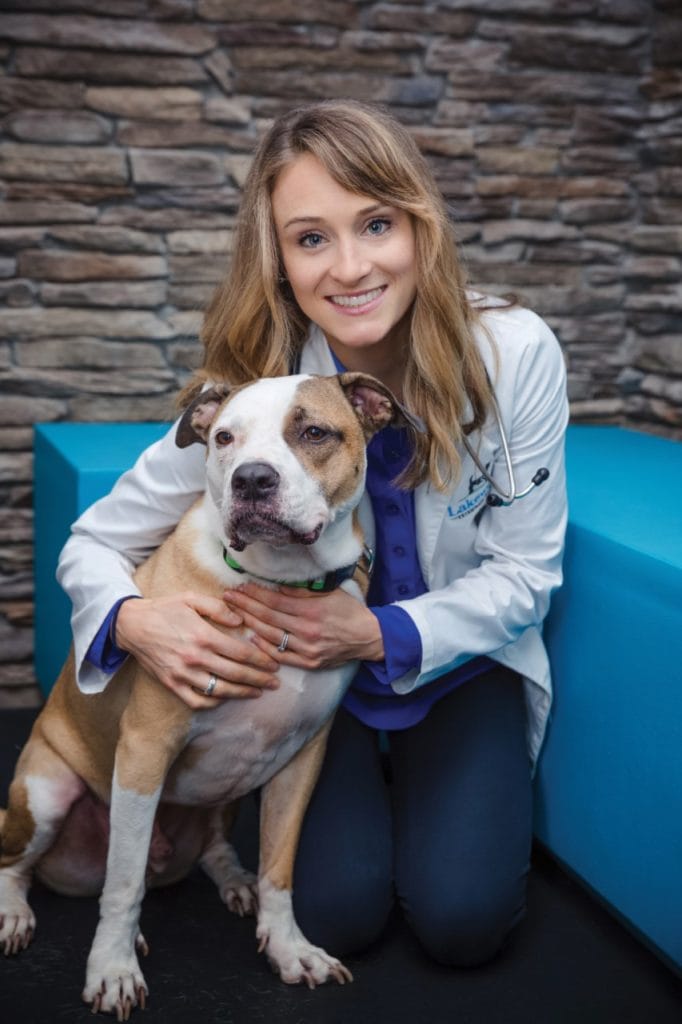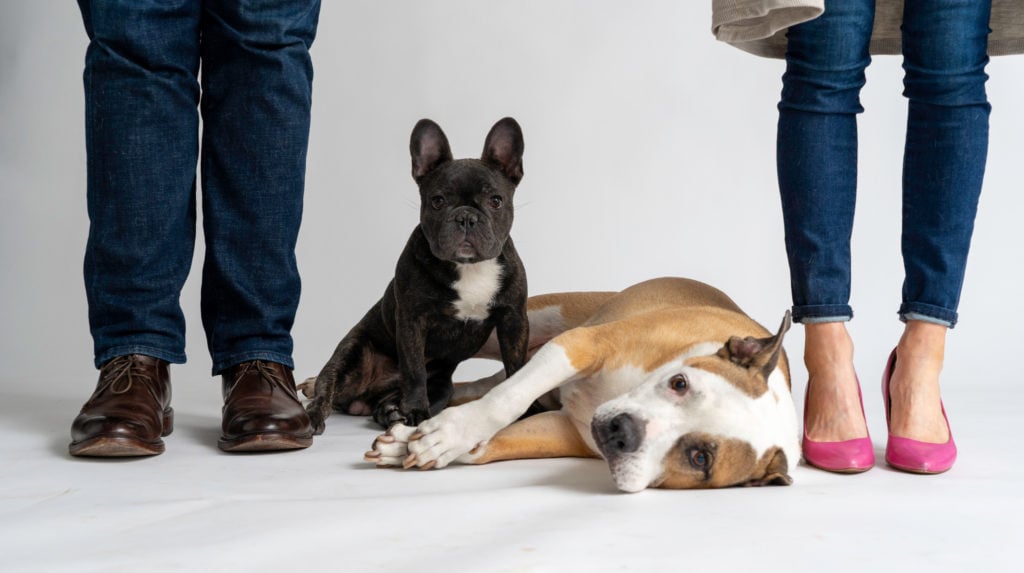As a health coach (for humans) and veterinarian, the well-being of both you and your pet are my top priority. That’s why I need to give you a heads up about what’s going on in the veterinary profession right now. To put it bluntly, the veterinary industry is really struggling and overwhelmed right now.
I’m not sending this message to be an alarmist, I’m sending it to spark change and hope. I want to raise awareness and to let you know what you can do to be proactive in order to keep your pet happy and healthy. (For the video version, scroll to the end of this post!)

First, how did we get here? Story time!
We started an exciting new decade, and then 2020 happened. That meant unexpected challenges for all of us in different ways. For many, it meant suddenly working from home or even job loss. For the veterinary profession, we experience the opposite.
We experienced a huge overwhelming influx of patients. This was for a couple of reasons:
1. You were suddenly home more! This meant that you were watching your pets more. It also provided an amazing opportunity to finally adopt or to get that puppy or kitten you’ve always wanted.
2. Pets were stressed. When your schedule and routines suddenly changed, their whole world did, too! On top of that, pets are very in tune with our stress and fear. As you may have experienced personally, stress impacts our whole body health.
While experiencing this increased case load, we had to simultaneously completely reinvent the way we worked.
In order to continue to provide care for your pet while keeping you and our team safe, maintaining communication (from a distance), and minimizing stress for everyone involved, it meant creating whole new protocols and a lot of trial and error.
This tricky combination led to long wait times and frustration on both sides.
It has been a stressful, exhausting, and emotional year while everyone works as hard as we can to see as many patients as possible. But this pace isn’t sustainable and we’re reaching our breaking point.
Here’s the current state of the veterinary profession:
Across the country, hospitals are overwhelmed and they’re having to turn away patients. Emergency hospitals have 6+ hour wait times, clinics are double and triple booked and still can’t keep up with the demand, and hospitals are cutting back on their hours because they simply don’t have the support staff to stay open.
I absolutely hate thinking about a pet having an emergency and not being able to get the care it needs. That’s why something needs to change, and in order to find solutions we need to work together.
The major problem right now is that we’re losing people. Here are some things you may not be aware of about the vet profession:
1. Our support staff are incredibly amazing, passionate people, and they’re severely underpaid.
They work long hours in a physically and emotionally demanding (and dirty) job for the sole reason that they are passionate about helping you and your pet. But these amazing people have been on the frontlines for the past year and a half dealing with increasingly impatient and unhappy clients. There’s only so long you can stay in a demanding job with long hours and little pay when you’re being yelled at or accused of not caring.
2. You may not know this, but veterinarians have one of the highest suicide rates of any profession.
Our job may seem like we’re just playing with puppies and kittens – and those blissful moments of cuddling with a sweet puppy are an absolute perk of the job (!) – but it’s not the majority of what we do. In order for this statistic to change, we need to talk about it and raise awareness. I promise you no one is in the veterinary profession for the money. We’re in it because we really truly care about you and your pet!

3. One of the biggest challenges in the vet profession involves money.
There’s a weird combination where pets are both a family member and a luxury item. That gets complicated! The hardest part of my job is knowing that I could help or save an animal and not being able to because of finances.
Vet bills can be a really annoying and unexpected expense, I get it! If your cat is suddenly peeing on everything or your dog gets into the trash and suddenly you have a huge bill, that doesn’t make for a great day.
If you’ve ever complained about vet bills, please take a moment to look at them from this perspective:
When you are complaining about prices or a bill to a us, you’re either telling a staff member who is already severely underpaid or a doctor who is likely still paying off massive student loan debt in order to be able to take care of your pet. We understand financial constraints.
The recommendations I make as a veterinarian for diagnostics and treatments aren’t to rack up your bill. They’re because often times, a physical exam only gives me so much information. I do not have a crystal ball and magic wand, and my recommendations are what’s necessary to provide the highest level of care to your pet. The money doesn’t go into our pockets, it goes to keep the hospital running.
Note, we’re always willing to work with you! We understand that not everyone has unlimited funds for veterinary care. We’re here to work with you as a team to come up with a solution that works for you and your pet. But please don’t expect us to provide free care or decrease prices. If that happened, there would be no veterinary profession left to take care of your pet.
Now, I have two hacks for instantly helping you feel like you’re getting a deal with your vet bill:
1. Compare your veterinary bill to what the equivalent would be in human health care without insurance or federal assistance. We use the same machines and medicine. You’ll be amazed at the deal you’re getting!
2. Get pet insurance. I’m a veterinarian, and I even have pet insurance. It makes it so that I can budget and plan ahead for unexpected expenses. Prices in the veterinary industry are going to be increasing soon in order to be able to pay support staff what they deserve and to account for the increased demand. Plan ahead. A really amazing website and resource is Petinsurancereview.com. It allows you to compare all of the different pet insurance companies out there, so that you can find the one that works best for you and your pet.

Here’s what else you can do to be proactive!
Remember that you are your pet’s person. They rely on you for everything. Please plan ahead.
1. Pay attention to your pet’s behaviors and if you notice any changes, schedule an appointment.
If your pet is vomiting, not eating, really thirsty, hiding, limping, not using the litter box, going to the bathroom too much, just not acting right, or if you have ANY concerns, please don’t wait. Be proactive and schedule an appointment before it becomes an emergency.
2. Schedule routine preventative care in advance.
Pets are really good at hiding signs of pain or disease. Annual physical exams and blood work are the best way for us to catch things early to be proactive about your pets health.
3. Please, be kind.
Many of these challenges are not unique to veterinary medicine. The 2020’s have been a challenging decade and we’re all tired. But let’s remember that we’re in this together, and we’re on the same side. What you say to someone else can leave a big impact. Unkind words stick, but one kind comment can make someone’s day.
If you’re experiencing a short fuse, pause and check in with yourself. How are you holding up? This year has been a lot, make sure you’re taking care of yourself and getting the support you need.
Want to help right this moment? Here’s what you can do!
- If you’re a pet owner or animal lover, please share this message.
- If you’re in the vet profession, please comment and share your experiences.
- Everyone: Today prioritize a random act of kindness. We could all use a boost in our day and you’ll be amazed at the incredible positive domino effect that takes place by one simple small act.
Let’s remember that we’re all in this together. Thanks for listening! <3


Leave a Reply